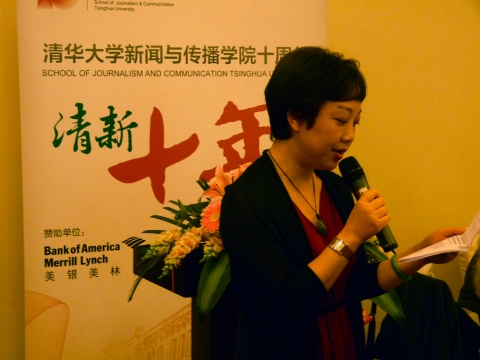
Tsinghua University’s School of Journalism and Communication celebrated its 10th anniversary May 12 and 13. The Global Business Journalism (GBJ) program was featured during the festivities.
Hang Min, co-director of the Global Business Journalism program, and Zhou Quingan, director of the International Journalism program at Tsinghua, emceed one of the events.

Crowds enjoyed a tribute to Bloomberg Editor-at-Large and Global Business Journalism program star professor Lee Miller.
Tsinghua School of Journalism and Communication students showed off a smart phone app they developed for the student newspaper.

ICFJ President Joyce Barnathan spoke on the importance of quality business journalism at the anniversary forum on “Innovation in Global Journalism and Communication.”

Lisa Xue, Bank of America’s chief administrative officer for China, greeted the students and faculty at a special luncheon event sponsored by the bank.
Bloomberg Editor-at-Large and Global Business Journalism program star professor Lee Miller with GBJ program alumna Han Miao.
Students celebrated on the Tsinghua University quads.
Colorful banners adorned the halls of the conference center on the Tsinghua campus.
Global Business Journalism program Co-Director James Breiner celebrated with students.
The Tsinghua School of Journalism and Communication celebrated its 10th anniversary May 12 and 13, and the International Center for Journalists, a partner in the school's Global Business Journalism program, played a role.
ICFJ President Joyce Barnathan talked about the innovative curriculum of the Global Business Journalism program in her remarks to an audience of 200 journalism professionals, deans and professors from China and around the world. "Our students learn, for example, how to mine and analyze corporate data for in-depth coverage of major global companies. They learn how business news organizations are using digital technology to tell stories in exciting, interactive ways."
Other highlights of the academic conference:
- Lu Xiaohua, editor-in-chief of China Xinhua News Network, said China is trying to develop an international media presence on the scale and stature of BBC, CNN, Russia Today and Al-Jazeera. It launched a 24-hour English language television service in 2010.
- Shi Anbin, associate dean of Tsinghua's school, said digital journalists should learn from Andy Carvin's one-man newsroom at National Public Radio in the United States. Carvin covered the Middle East during the Arab Spring upheavals in 2011 by relying on numerous local activists, bloggers and reporters through social networks such as Twitter.
- Qu Yingpu, deputy editor-in-chief of China Daily, noted that social media are spreading news so rapidly that is no longer possible to control the flow of information. The response of China Daily has been to provide more information to more audiences, with editions targeted for Africa, Asia and Europe, among others.
- Li Liangrong, professor of journalism at Fudan University, said the media need to provide more in-depth coverage, especially now that there are so many brief news items on the web. The web offers the possibility of presenting "converged news," or reports "in multiple dimensions." The standard should still be news that is "open, fair, equitable, extensive and intensive."
- Yoichi Nishimura, former managing editor of Asahi Shimbun newspaper in Japan, told how the 2011 earthquake changed the newspaper's relationship with its readers. It shared extensive information on missing persons with Google that resulted in a large, joint database to help track down people. In addition, the mass media used Twitter and Facebook extensively to spread disaster-related information and to promote useful linkage of information.
- Andrew Leckey, president of the Donald W. Reynolds National Center for Business Journalism at Arizona State University, said it is a great time for young people to be entering the profession. While daily newspapers are shrinking, the demand for business journalists is growing. The most interesting global stories now are business stories.
Student show
The celebration ended Sunday night with a four-hour stage extravaganza produced by the journalism school's students. This annual event had a 10th anniversary theme, as it honored graduates from the past decade.
Several videos and animations showed student mastery of video techniques. The students staged a drama about an ethical journalist faced with a dilemma when confronting his boss, who was more interested in generating advertising than revealing the environmental risk of a manufacturing plant.
The audience favorites were the comedy skits, which made fun of many of the professors, and the dance routines, which included flamenco, kung fu, break dancing, aerobics and modern dance routines.